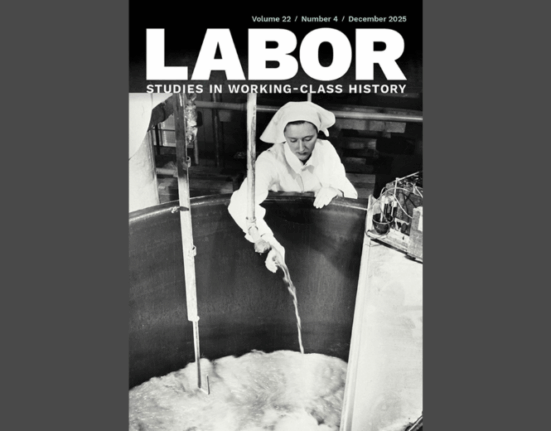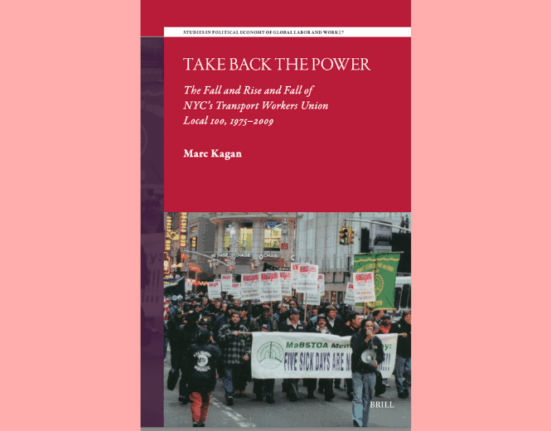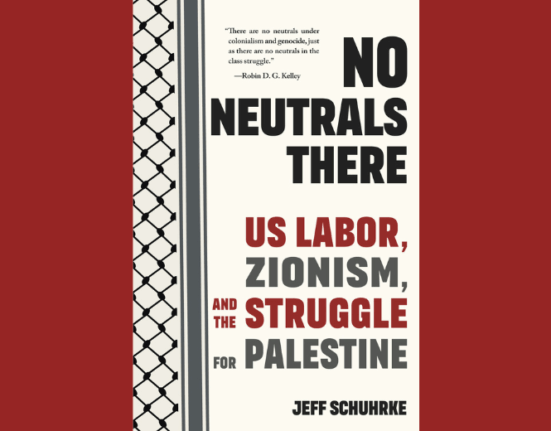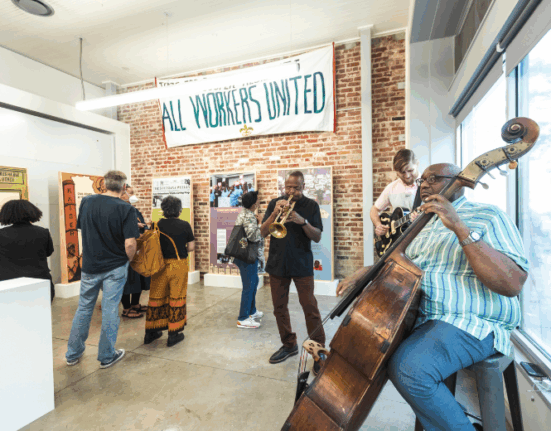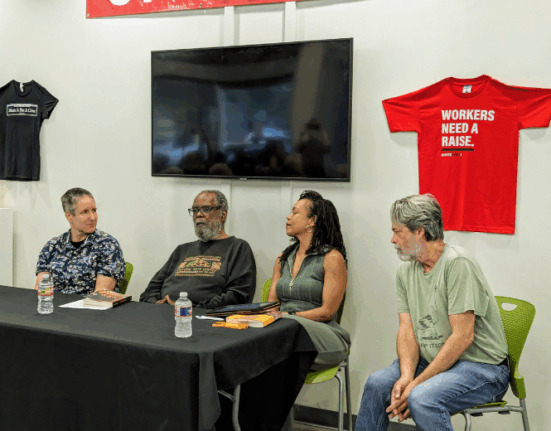I became a labor historian in the spring of 2014. This was unexpected. I was already in the third year of a doctoral program in the history department at Columbia University, studying war and memory in United States political culture. For PhD programs, the end of the third year is a little late in the day to switch topics, let alone sub-disciplines. Most of my formal graduate education was already behind me—course work, the master’s thesis, oral exams. But by the spring of 2014 my experience organizing in the grad worker unionization campaign had radically changed my idea of what history was and my reasons for studying it. The labor movement organized me into becoming a labor historian.
The historical forces culminating today in rising worker militancy are the same that have led many of my contemporaries in academia to become labor organizers and, for me, at least, a labor historian.
I’ve realized recently that my experience was in a certain respect quite typical, and I thought it might make sense to dwell on it for a moment as a way to take stock of the kinds of cultural gains the labor movement has made in the past decade. Labor history is currently enjoying a renaissance, or to be more precise, a vogue. Journalists are writing about it. Undergrads want to study it. The reason for this is clear. The dynamism of worker organizing has made labor history newly urgent. And the effects are cascading. The same year I went on strike with my fellow Columbia grad workers in 2018, public school teachers from every county in West Virginia walked out of their classrooms in defiance of a hike in their insurance rates. Today, grad workers organizing at West Virginia University credit their public school teachers with showing them what labor organizing is and how it works. The historical forces culminating today in rising worker militancy are the same that have led many of my contemporaries in academia to become labor organizers and, for me, at least, a labor historian.
The Recession of 2008, the year I graduated college, remains perhaps the most formative “historical” event of my life. I was unemployed for two years. Growing up middle-class, I had assumed that if I worked hard and checked all the boxes, things would always work out for me. The Recession shook that faith. Instead of leapfrogging from one safe island to the next, I felt like I had been issued into a void through which I would freefall for the rest of my life. Of course, the lingering effects of the Recession are very real, especially for millennials, but for me the event now serves just as much as a narrative landmark, a moment that signaled precarity’s very public coming out party for the middle class, the degree to which instability had become a constitutive feature of everyday life.
When I applied to grad school, I initially considered it as “five years of money,” a place where I would have the chance to read some books and take shelter from the economic storm until things stabilized. But things never did seem to stabilize. When I matriculated in 2011, much of the talk among grad students as well as our teachers concerned the abysmal job market and the accelerating decline of the profession. At my cohort’s first-year orientation, a sympathetic professor advised us to consider dropping out of the program entirely. The prospects for future employment were, and remain, that bad. In terms of making a living, it would seem, the world did not need historians. Or did not want them. Or would not pay for them
The more the university gestured towards addressing the structural problems, the more bankrupt it appeared. If this was the profession’s answer to the problems of job degradation, we were in trouble.
This was, to say the least, demoralizing. The university recognized the seriousness of the overlapping crises in higher education, but the solutions it proposed were disappointing. The Graduate School of Arts and Sciences held workshops and conferences to help doctoral candidates explore career options in history outside of academia. Titles like, “What can you be with a PhD?” and “History in Action,” stand out in my memory. (Some of the more rueful among us took to calling the latter, “history inaction.”) The more the university gestured towards addressing the structural problems, the more bankrupt it appeared. If this was the profession’s answer to the problems of job degradation, we were in trouble. At best they offered escape pods built for lone individuals lucky enough to land a job in corporate America. More substantively, however, these fig leaf attempts to address academia’s inability to reproduce itself added up to an acknowledgement that the university had largely ceased to value the work of scholarship. The breakneck pace with which universities themselves were embracing job degradation was reminiscent of what was happening to journalism, as though the culture had decided to make war on its own mechanisms of formal, public, critical thinking.

Then the union happened. My partner, Lindsey Dayton (who now prefers to be called Lou, and who is now also, incidentally, my spouse), was central to rebooting the graduate worker organizing campaign at Columbia in 2013. A campaign in the early 2000s had culminated in a union election, but a Bush-appointed National Labor Relations Board squashed it, with the votes left uncounted. Lou came out of the labor movement, having been an organizer with Unite Here before herself becoming a PhD candidate at Columbia. She was my lead, but not mine alone. Crucially in those first few years, she taught the organizing committee the craft of organizing. She showed us how to map our workplace, how to talk to one another without alerting our employer, and how to build power. Thanks in large part to her expertise and energy, before we decided to affiliate with UAW Local 2110 we already had organizers in more than twenty departments and across several campuses. Years later, a representative from the international told me how much this single fact had impressed him. We had built, in his words, “a hot shop.” That is, a shop that was already organizing itself.
It’s a cliché, but it’s true: organizing works. Once the union went public, I saw my working conditions change for the better. Stipends increased and complaints were taken more seriously by those in authority. While our employer still refused to recognize the union (and eventually only did so when compelled by the federal government), it was nevertheless obvious that the improvements the administration made to our working lives were entirely the result of our organizing. After years of feeling helpless and lost, I finally had some small measure of power over my destiny. It was a revelation. I was watching power bend. Things could change; things could be better; we could collectively make them better. And if that was true for my workplace, maybe it was true for other things, too.

Then the same thing that’s happened to unionizing workers in countless professions since the dawn of industrialization also happened to me: I began to see what was valuable in my job, in this case, the practice of history, and to gauge the immense distance between its value to society and the cheapness it held in my employer’s eyes. Attending and participating in meetings and trainings, talking to colleagues and asking them to sign union cards, I began to see why a person might desperately need history.
History of course had a very practical application. We benefited from veteran organizers of earlier union campaigns who laid out the long story of this struggle, what employers had done in the past, and how we might anticipate their moves. But beyond this version of history-as-playbook, the necessity of history presented itself all the time in subtler and deeper ways. My main beat was the medical campus. Between 2015 and 2017, I spent at least three days a week there, walking through labs, meeting people, talking about the union. Workers pipetting at their benches and uncertain about the benefits of unionization generally asked the same kinds of questions. “Have grad unions organized before? How did that go? What did they get?” These questions were of course reasonable, but on the most fundamental level they were all also the same question, one that I came to see as perhaps the most basic concern. What is the realm of possible? Or to put it another way, How much can we shape the future?
To respond to that concern, I needed to learn about what workers had achieved for themselves through collective action. The answer, it turned out, was encouraging: What was possible? How much power did we have over the future? A lot, actually. Much more, even, than we might dare to think. The labor movement taught me that we need history to imagine a better world, and then to make it so. Studying the past reveals contingency. It shows us all the ways that people make their own history, even if not just as they might please. From that vantage point, the future becomes a much more open, more hospitable place, a realm of potential freedom where you could have more say over your life than the current order of things might wish you to believe. The reason labor history is so useful for this kind of thinking is because of its almost monomaniacal focus on the struggle of ordinary people to challenge the most fundamental institutions of hierarchy.
At the same time that the union taught me about history, it also helped to professionalize me as a scholar. Union organizing was incontestably the most robust inter-disciplinary experience of my graduate education, as well as the most meaningful connection I have today with my colleagues within the field of labor history. At LAWCHA events, I always run into people with whom I organized in the grad union movement. We first met at UAW conventions, or at union trainings, or on the picket line. Then, the staff of the unions themselves connected us. For example, many of the same organizers from the UAW international advising Columbia academic workers also consulted the campaigns at NYU, at UConn, and at Harvard. In that way, the labor movement itself performed some of the functions of a scholarly organization, only in my experience, better. Because unlike many scholarly organizations, labor organizing begins from the position of solidarity. Many of us who came out of the grad unions continue to maintain strong connections to the labor movement as well as to colleagues who left academia to work for unions full time.
Should any future historians write an account of the union organizing that swept through academia in the 2010s, they would do well to track where those organizing grad workers landed afterwards. At that moment, future members of the professional managerial class across higher education began identifying their needs and their situation in life with the labor movement. They gained firsthand craft knowledge not only of organizing, but the experience of challenging their employer—and winning. It was an ironic realization of what in the 1960s the New Left had anticipated as the New Working Class theory, although then, the New Left imagined it as the introduction of the labor movement into the middle class (like in SDS’s 1967 Port Authority Statement), not the degradation of the middle class so that it began to identify with the proletariat. The Ehrenreichs’ naming of the professional managerial class in the late 1970s still most definitely holds analytically, and academic workers who manage to climb the scholarly job ladder successfully shouldn’t be confused with the proletariat. As grad workers, however, we couldn’t ignore just how easy it had become to be ejected from the ranks of the PMC. At any moment, it seemed, we could fall out of it.
Obviously, many of the founding members of LAWCHA also have deep ties to the labor movement and were themselves products of it. The feeling of collaboration and purpose I’ve experienced at LAWCHA’s conferences is something I’ve encountered nowhere else in academia other than the academic worker unionization movement. Founded in the 1990s, the low-ebb of labor in the US, I can imagine LAWCHA’s creators having felt like things were slipping away. If anything distinguishes “millennial” scholars then, it is perhaps a question of perspective. Neoliberalism has declassed them and burdened them with debt. It remains unclear if the planet will still be inhabitable when they reach retirement age. Just as importantly, even though the labor movement was ailing when they created the organization, the founding generation of LAWCHA had cut its teeth on cultural revolution and the opening up of society—with victories in civil rights, women’s rights, immigrant rights, gay rights, the anti-war movement. Millennials have come of age in a time of rapidly shrinking horizons, a suspicion that much of what was won might soon be lost. That anxiety certainly underwrote much of the grad worker organizing campaigns, the sense that something needs to be done, and soon, to stave off complete dissolution.
Confronted with institutions that refused to address the systemic failures of the early twenty-first century, the labor movement stepped in to fill the gaps.
Many working people and would-be middle class professionals have of late shared my experience with the labor movement. Confronted with institutions that refused to address the systemic failures of the early twenty-first century, the labor movement stepped in to fill the gaps. Weakened, in many cases compromised, unions nevertheless have remained among the few institutions in neoliberal America that could authentically channel my grievances and produce some form of relief that wasn’t just culture-war posturing. It diagnosed real problems and offered real solutions; it had a theory of constructive social conflict. Most important, in place of the hyper-atomization of late capitalism, it offered an alternative, collective vision of society. Along the way, the labor movement also taught me the value of history. And there I don’t think I’m alone. For me, it changed my life. Taking in the labor scene today, I think it might change the country, too.


